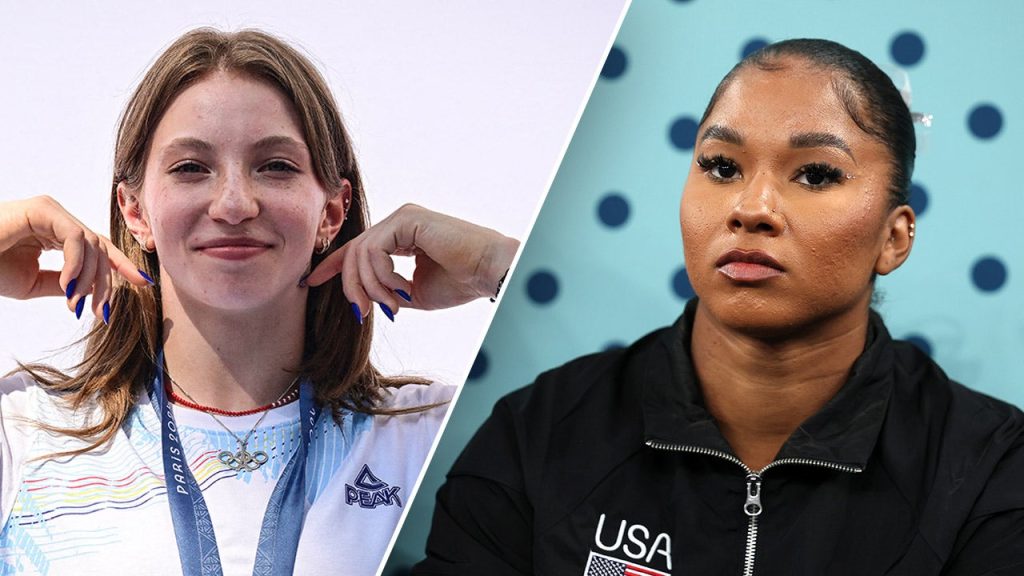The world of NCAA gymnastics is poised for a dramatic showdown with the arrival of Romanian Olympic medalist Ana Barbosu at Stanford University. Barbosu’s commitment sets the stage for a potential rivalry with American gymnast Jordan Chiles, who competes for UCLA. While the two universities have historically been rivals in the Pac-12, recent conference realignments have placed them in different athletic conferences – UCLA in the Big Ten and Stanford in the ACC. However, their gymnastics programs continue to compete against each other, ensuring future encounters between Barbosu and Chiles. This adds another layer of complexity to their already strained relationship stemming from a controversial bronze medal dispute at the 2024 Paris Olympics.
The controversy erupted during the floor exercise final in Paris when Barbosu initially secured the bronze medal. However, a subsequent appeal by a U.S. coach regarding Chiles’ score resulted in a recalculation, elevating Chiles to third place and leaving Barbosu heartbroken. The Romanian gymnast’s visible distress captured the attention of the world as she reacted to the sudden reversal of fortune. Days later, the Court of Arbitration for Sport (CAS) ruled that the judges had improperly granted the U.S. appeal, deeming it late and therefore invalid. The International Olympic Committee subsequently ordered Chiles to return the bronze medal, a decision she has yet to comply with.
The CAS ruling and the IOC’s decision sparked a wave of reactions. Chiles publicly criticized the ruling as “unjust” and alleged racially motivated attacks on social media. Barbosu, upon receiving her rightfully earned bronze medal, expressed sympathy for both Chiles and her Romanian teammate, Sabrina Maneca-Voinea, whose results were also affected by the scoring changes. Barbosu emphasized the importance of the Olympic spirit and hoped for a future where all three gymnasts could share the bronze medal. The controversy highlighted the complex interplay of rules, appeals, and the emotional toll on the athletes involved.
Chiles’ subsequent statements further fueled the controversy. During the Forbes Power Women’s Summit 2024, she tearfully linked the emotional distress she experienced from losing the medal to her “skin color.” This statement followed earlier claims of racially driven attacks on social media, further intensifying the debate surrounding the medal dispute. The controversy also gained significance as Chiles’ initial win had resulted in the first all-Black gymnastics podium in Olympic history, adding a layer of social and cultural significance to the unfolding events.
The legal battle over the bronze medal continues. Chiles, backed by Team USA, is appealing the CAS decision, arguing that the appeal was timely and supported by video evidence. Her legal team also alleges a conflict of interest involving the CAS panel president, citing his previous representation of Romania. This legal challenge adds another dimension to the controversy, raising questions about procedural fairness and potential biases within the arbitration process. The ongoing legal proceedings underscore the complexities of international sports disputes and the pursuit of justice within the framework of sporting regulations.
The upcoming NCAA gymnastics season promises to be a captivating spectacle with the arrival of Barbosu. The potential matchups between Barbosu and Chiles will undoubtedly be highly anticipated, carrying the weight of their Olympic history and the unresolved medal dispute. Their encounters will likely draw significant media attention and fan interest, further amplifying the drama surrounding the controversy. The NCAA stage will provide a new platform for these two talented gymnasts to showcase their skills and compete at the highest level, albeit under the shadow of their past entanglement. Their performances will be closely scrutinized, as audiences anticipate not only athletic excellence but also the subtle nuances of their interactions, given the backdrop of their contentious Olympic experience.

